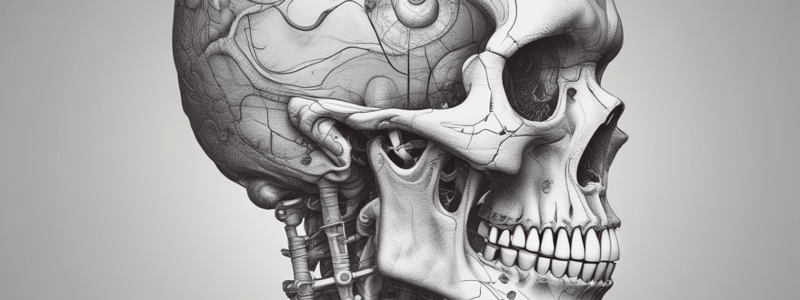Podcast
Questions and Answers
Which bone is part of the pectoral girdle?
Which bone is part of the pectoral girdle?
- Tibia
- Scapula (correct)
- Femur
- Fibula
Which joint primarily permits back-and-forth and side-to-side movements?
Which joint primarily permits back-and-forth and side-to-side movements?
- Planar joint (correct)
- Pivot joint
- Hinge joint
- Saddle joint
What type of joint is found at the elbow?
What type of joint is found at the elbow?
- Condyloid joint
- Hinge joint (correct)
- Pivot joint
- Ball-and-socket joint
Which bone is part of the pelvic girdle?
Which bone is part of the pelvic girdle?
Which joint enables the palms to turn anteriorly and posteriorly?
Which joint enables the palms to turn anteriorly and posteriorly?
Where is a ball-and-socket joint located?
Where is a ball-and-socket joint located?
Which bone is not part of the upper limbs?
Which bone is not part of the upper limbs?
What fits into the 'saddle' of a saddle joint?
What fits into the 'saddle' of a saddle joint?
Flashcards are hidden until you start studying
Study Notes
Appendicular Skeleton
- The pectoral girdle, consisting of the scapula and clavicle, attaches the bones of the upper limbs to the axial skeleton.
- The bones of the upper limbs include the humerus, ulna, radius, carpals, metacarpals, and phalanges.
- The pelvic girdle, composed of two hip bones, joins the sacrum posteriorly and meets anteriorly at the pubic symphysis, allowing attachment of the bones of the lower limbs to the axial skeleton.
- The bones of the lower limbs include the femur, patella, tibia, fibula, tarsals, metatarsals, and phalanges.
Synovial Joints
Planar Joints
- Allow back-and-forth and side-to-side movements, found in intertarsal joints.
Hinge Joints
- Produce an opening and closing motion, permitting only flexion and extension, found in knee and elbow joints.
- Consist of components such as the terminal phalanx, middle phalanx, hyaline cartilage, synovium, extensor tendon, and fibrous capsule.
Pivot Joints
- Enable rotation around a single axis, found in joints that allow the palms to turn anteriorly and posteriorly.
- Characterized by the surface of one bone articulating with a ring formed partly by another bone.
Condyloid Joints
- Found in the wrist, where the projection of one bone fits into the oval-shaped depression of another bone.
- Components include the head of radius, annular ligament, radius, radial notch, ulna, scaphoid, and lunate.
Saddle Joints
- Found in the thumb, where the articular surface of one bone is saddle-shaped, and the articular surface of the other bone fits into the "saddle".
Ball-and-Socket Joints
- Found in the shoulder and hip joints, where the ball-like surface of one bone fits into a cuplike depression of another bone.
- Components include the radius, trapezium, metacarpal of thumb, and acetabulum of hip bone.
Studying That Suits You
Use AI to generate personalized quizzes and flashcards to suit your learning preferences.



